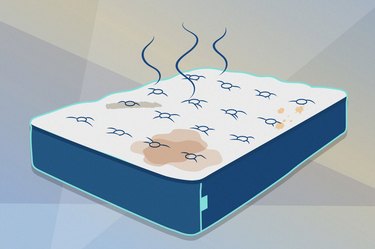
You know your mattress isn't supposed to last forever. But if it isn't majorly damaged or worn out, is it really that awful to just...keep sleeping on it?
Mattresses don't typically come with expiration dates. But "depending on the mattress quality and how you use it, most mattresses should be replaced every seven to 10 years," says Kunal Kumar, MD, Medical Director of the Sleep Center at Einstein Medical Center in Philadelphia. "If you notice sagging or indentation, are waking up with aches or pains or are having trouble sleeping with no other obvious reason, then it's probably time," he says.
Video of the Day
Video of the Day
On the other hand, buying a new bed can be expensive, not to mention time-consuming. So is it really so bad to put off purchasing a new one? Here's what the experts have to say, plus how to know when it's time for an upgrade.
The Effects of Sleeping on an Old Mattress
Snoozing on an old, sagging guest bed for a night or two when you stay at someone else's house isn't a huge deal. But when you're sleeping on a worn-out mattress night after night, the effects can add up.
1. Your Sleep Gets Disrupted
This one's obvious, but important. A mattress with a ton of wear and tear isn't going to feel as good as one that's still in its prime. "Your body isn't supported in the way it should be to get good rest," Dr. Kumar says. "So you're tossing and turning to get comfortable, which can lead to poor quality sleep."
Another reason you might not sleep well? Older mattresses make it harder for you to stay cool while you snooze. "They may not regulate temperature properly and cause excessive heat and less room for airflow," explains Ronald Tolchin, DO, Medical Director the Spine Center with Baptist Health Miami Neuroscience.
All together, that can quickly leave you feeling consistently tired, sluggish or irritable during the day. Sleep deprivation can increase your risk for serious health problems over time too, including depression, high blood pressure, obesity and diabetes, according to the National Institutes of Health.
2. You'll Be More Prone to Back and Joint Pain
So many little things can make your back ache. And if your mattress has had a few too many birthdays, you can add it to the list.
"Worn-out foam or innersprings in a mattress will soften and sag over time," Dr. Tolchin explains. That can cause your body to dip or sag into the mattress and throw your spine out of alignment or trigger uncomfortable pressure points.
3. You're Exposed to More Dust and Allergens
Fun fact: The average mattress is home to between 100,000 and 10 million dust mites, according to the Cleveland Clinic. (The microscopic bugs love to feed on dead skin flakes, which get shed onto your mattress every time you lie on it.)
Over time, mattresses can also accumulate particles wafting around your bedroom environment, like dirt, pet dander or even pollen. Even if you regularly wash your bedding.
That's gross, and if you have allergies or asthma, it can actually make your symptoms worse, explains Joyce Yu, MD, a pediatric allergist and immunologist with Columbia University Irving Medical Center. Think: more mucus or congestion, itching, throat-clearing, postnasal drip, coughing, headaches or fatigue.
As a result, you might find yourself snoring more or feeling more sluggish during the day, which can affect your ability to function at work or school, Dr. Yu adds.
When Should You Buy a New Mattress?
The average mattress lifespan is between seven and 10 years, Dr. Kumar reminds us. But different factors can affect that timeline. Adjustable mattresses and beds made of high-quality foam or natural latex tend to last longer than their innerspring counterparts, Dr. Tolchin says. And a mattress that's only used occasionally (like one in a guest room) will outlast one that's used every night.
Rather than just counting the years, you can pay attention to the signs that a mattress has passed its prime. According to Dr. Tolchin, it may be time to go mattress shopping if:
- The mattress seems to negatively affect your sleep or you're tossing and turning throughout the night
- You can see sagging or indentations in the mattress
- You're waking up with muscle or joint stiffness
- You find you sleep better in hotel rooms or guest bedrooms (which may have newer mattresses) than at home
- You notice an increase in allergy symptoms and can't pinpoint another cause
When Is the Best Time to Buy a New Mattress?
The best time to spring for a new bed is when your old one isn't cutting it anymore. But in terms of getting the best deal, the best time to buy a new mattress is typically around a holiday weekend. More specifically, you may want to shop near Presidents' Day, Memorial Day, Fourth of July or Labor Day weekend. You're also sure to find discounts on Black Friday (the Friday after Thanksgiving).
What to Look for in a New Mattress
Mattress comfort is highly subjective, so much about finding a new bed comes down to personal preference. "Factors like spring versus foam, for instance, depend on personal choices and how much money you want to spend on your mattress," Dr. Kumar says.
Paying attention to the mattress's firmness level can be helpful. Side sleepers should look for a mattress that's medium-soft to medium-firm, so your shoulders and hips are better supported.
Back sleepers or those who struggle with back pain might do better on a mattress that's medium-firm to firm, says Dr. Kumar.
And if you tend to overheat easily, consider looking for a cooling mattress that will maximize airflow.
So, How Bad Is It Really to Sleep on an Old Mattress?
It can be easy to put off buying a new mattress. But sleeping in a worn-out bed can leave you uncomfortable, exacerbate allergies or asthma and make it harder to get the rest you need, which could have a ripple effect on your health.
"If you're experiencing symptoms, you know that it's time," Dr. Kumar says.
Was this article helpful?
150 Characters Max
0/150
Thank you for sharing!
Thank you for your feedback!
Is this an emergency? If you are experiencing serious medical symptoms, please see the National Library of Medicine’s list of signs you need emergency medical attention or call 911.



